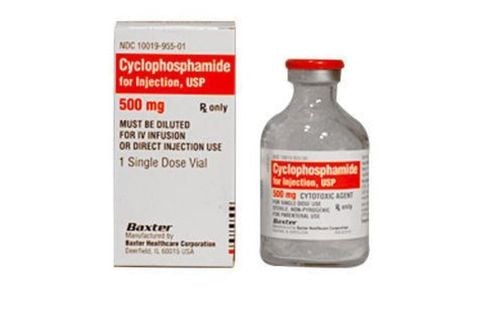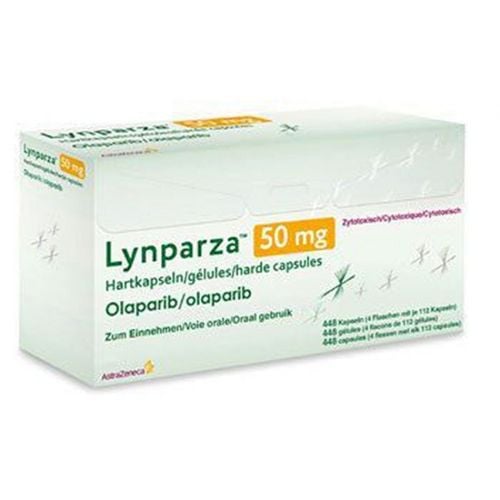This is an automatically translated article.
The drug Niraparib is a PARP inhibitor. It is indicated for the maintenance treatment of adults with recurrent epithelial ovarian, fallopian tube, or primary peritoneal cancer who have responded partially or completely to chemotherapy.
1. What is Niraparib?
Niraparib is a poly(adenosine diphosphate [ADP]-ribose) polymerase (PARP) inhibitor. Cancers associated with BRCA1 or 2 mutations rely on PARP to repair damaged DNA in cancer cells, allowing them to continue dividing. By inhibiting PARP, tumor growth can be slowed or stopped.2. What are the uses of Niraparib?
Niraparib is used for the maintenance treatment of adult patients with recurrent epithelial ovarian, fallopian tube or primary peritoneal cancer who have responded partially or completely to chemotherapy.3. How to use Niraparib?
Niraparib is available in the form of a capsule taken once a day. The drug is not affected by food, so you can take it at any time of the day. However, you should fix a fixed time to take the medicine to avoid possible forgetting. How to take Niraparib: Take the entire capsule. You should not open, crush, break or chew the capsule. In case you miss a dose, do not take two doses to make up for a missed dose. In case you vomit after taking your therapeutic dose, absolutely do not use another dose with the intention of making up for it. Take your next dose at the usual scheduled time. Before each dose of treatment, you need to check to see if what you are taking matches what you have been prescribed. This medicine may affect your blood counts. These levels will be checked with a blood test before starting treatment with Niraparib and then once a week for one month and then once a month for an eleven-month period.
4. How to store Niraparib
Store your Niraparib in its original, labeled packaging at room temperature and in a dry place (unless otherwise directed by your treating physician or clinical pharmacist). Niraparib should not be stored in the box. Keep the Niraparib container out of the reach of children and pets. When a caregiver helps with medication preparation:
Caregivers should wear gloves or pour medication directly from their container into a lid, small cup, or directly into your hand. Avoid touching the pill. Caregivers should wash their hands before and after giving you medicine. Pregnant or nursing women should not prepare Niraparib.
5. Undesirable effects of the drug Niraparib
Here are some of the most common or important side effects of using Niraparib:
5.1. Nausea or vomiting a lot You can control vomiting after using the drug by making dietary changes: limiting the intake of fatty, spicy or acidic foods (lemon, tomatoes, oranges) ). You can make a warm cup of ginger tea to ease the symptoms.
5.2. Fatigue Fatigue is very common during cancer treatment. In many patients, there is even a feeling of near exhaustion that is often not relieved by rest. To reduce feelings of fatigue, you can add more rest, light exercise, energy focus, and important activities of the day.
5.3. Decrease in white blood cell count Leukopenia or neutropenia is a common undesirable effect during treatment with cancer drugs. White blood cells are very important for fighting infections. When your white blood cell count can drop, it puts you at a higher risk of infection. Characteristic signs of infection are fever with a body temperature above 38°C accompanied by signs of a sore throat or cold, shortness of breath, cough, burning when urinating, or persistent pain that doesn't go away.
5.4. Anemia Red blood cells carry oxygen to the tissues in your body. When your red blood cell count is low, you may feel tired or weak. You should let your doctor know if you experience shortness of breath, shortness of breath, or chest pain. If your red blood cell count is too low, you may receive a blood transfusion.
5.5. Low platelet count (thrombocytopenia) Platelets are factors that help blood clot, so when your platelet count is low, you have a higher risk of bleeding. Watch for signs of thrombocytopenia, such as any bruising or excessive bleeding, including nosebleeds, bleeding gums, or blood in your urine or stools. If the platelet count becomes too low, you may be given a platelet transfusion.
5.6. High toxicity to the liver Pentostatin can cause hepatotoxicity. Your doctor will monitor your liver function through blood tests. Also, watch for other signs such as yellow skin or eyes, dark or brown urine, or pain in your abdomen, as these could be signs of liver toxicity.
5.7. Insomnia Insomnia is a change in sleep and can include being unable to fall asleep or having trouble falling asleep. This medicine may cause or worsen pre-existing insomnia. Notify your healthcare provider if you are experiencing changes in your sleep.
5.8. Less common side effects: Heart problems/High blood pressure: Pentostatin can cause high blood pressure and heart palpitations. Your blood pressure and heart rate will be monitored regularly. If you have symptoms such as headache, dizziness, feeling like a fast heartbeat, irregular heartbeat, or fluttering, contact your doctor right away. Secondary Cancer: Secondary cancer is a disease that develops as a result of cancer treatment for another cancer. In most cases, the secondary cancer associated with chemotherapy is a blood cancer (leukemia, lymphoma). This can happen years after treatment. This adverse effect is usually associated with repeated treatment or high doses. Posterior Reversible Encephalopathy Syndrome (PRES): PRES is a rare reversible neurological disorder that may occur with the use of Niraparib. Symptoms of this syndrome include seizures, high blood pressure, headaches, confusion, fatigue, confusion, any change in your vision, or trouble walking or thinking.
6. Effect of Niraparib on fertility
Exposure to Niraparib to your unborn baby can cause birth defects, so you should not become pregnant while taking this medicine. Use of birth control is necessary during treatment and for at least 6 months after treatment, even middle-aged women who do not have periods can still be fertile and conceive. You should not breast-feed while you are using Niraparib or for one month after your last dose. In summary, Niraparib is a PARP inhibitor. It is indicated for the maintenance treatment of adults with recurrent epithelial ovarian, fallopian tube, or primary peritoneal cancer who have responded partially or completely to chemotherapy.
Follow Vinmec International General Hospital website to get more health, nutrition and beauty information to protect the health of yourself and your loved ones in your family.
Please dial HOTLINE for more information or register for an appointment HERE. Download MyVinmec app to make appointments faster and to manage your bookings easily.













